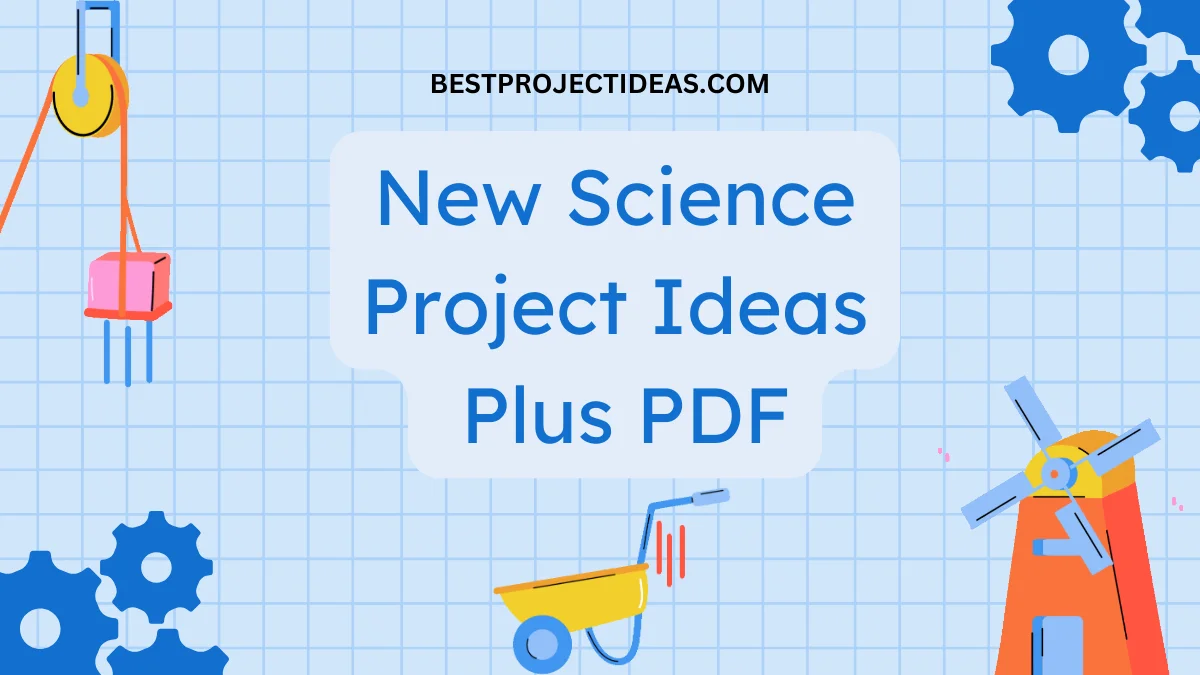
Exploring new science projects is a fun way to learn about the world. These projects let kids try out exciting experiments and discover cool things. When students work on these projects, they get to be like real scientists, figuring out how things work.
New science projects make learning more exciting and make science more interesting. These projects also help kids think in new ways and solve problems. Each new idea offers a chance to learn something special. Dive into new science projects and enjoy the adventure of learning!
Must Read: 211+ Top Engineering Clinics Project Ideas In 2024
Benefits Of New Science Project Ideas
- Innovation: New ideas make creativity grow and lead to new things.
- Problem-solving: Solving challenges with fresh ideas.
- Curiosity: Wanting to learn and explore more.
- Learning: Gaining new skills and understanding tough ideas.
- Collaboration: Working together to share thoughts and views.
- Confidence: Building belief in oneself and abilities.
- Real-world applications: Using science knowledge in real life.
- Career opportunities: Learning important skills for future jobs.
- Personal growth: Broadening experiences and becoming more well-rounded.
- Positive impact: Helping make the world and society better.
New Science Project Ideas For High School
Here are the new science project ideas for high school:
Biology
- How does music help plants grow?
- What bacteria are on your phone?
- Can you inherit traits from your grandparents?
- How do animals adapt to their environment?
- What is the chemical makeup of a leaf?
- Can you make a homemade antibiotic?
- How does exercise affect the brain?
- What is the impact of climate change on biodiversity?
- Can you design a genetically modified organism?
- How do viruses spread?
- What is the role of mitochondria in cells?
- How does sleep affect memory?
- Can you extract DNA from a banana?
- How does pollution affect marine life?
- What is the difference between prokaryotic and eukaryotic cells?
Chemistry
- Can you make a super absorbent material?
- How can you create a homemade battery?
- What pollutants are in your local water source?
- Can you extract DNA from a strawberry?
- What is the chemical makeup of a leaf?
- Can you create a homemade perfume?
- How does acid rain affect soil?
- Can you design a new type of fuel?
- What is the chemical composition of a star?
- How does baking soda work?
- Can you create a homemade cleaning solution?
- What is the difference between a physical and chemical change?
- How does rust form?
- Can you create a homemade indicator?
- What is the difference between an acid and a base?
Physics
- How does a roller coaster work?
- Can you build a homemade radio?
- How does a kaleidoscope work?
- Can you build a solar oven?
- How does an electromagnet work?
- Can you create a homemade hovercraft?
- How does a rocket work?
- What is the speed of sound?
- Can you build a homemade telescope?
- How does a laser work?
- What is the difference between mass and weight?
- How does a refrigerator work?
- Can you build a homemade generator?
- What is the law of conservation of energy?
- How does a satellite stay in orbit?
Earth Science
- What type of rock is most common in your area?
- How does weather affect plant growth?
- How do ocean currents affect climate?
- Can you build a homemade telescope?
- How does pollution affect wildlife?
- Can you create a homemade seismograph?
- How does the Earth’s magnetic field work?
- What is the difference between a hurricane and a typhoon?
- Can you create a homemade barometer?
- How does soil erosion occur?
- What is the water cycle?
- How does climate change affect sea levels?
- Can you identify different types of clouds?
- What is the difference between weather and climate?
- How do plate tectonics shape the Earth’s surface?
Environmental Science
- How does deforestation affect climate change?
- What is the impact of plastic pollution on marine life?
- Can you build a wind turbine?
- How can you reduce your carbon footprint?
- Can you design a sustainable garden?
- What is the greenhouse effect?
- How does acid rain affect forests?
- Can you create a homemade water filter?
- What is the difference between renewable and nonrenewable energy?
- How does pollution affect air quality?
- Can you create a homemade compost bin?
- What is the difference between biodegradable and non-biodegradable materials?
- How does water pollution affect aquatic ecosystems?
- What is the impact of mining on the environment?
- How can you conserve water?
Engineering
- Can you build a robot that can solve a maze?
- Can you build a homemade circuit board?
- How can you design a bridge that can withstand a heavy load?
- Can you design a prosthetic limb?
- Can you build a model rocket?
- Can you create a homemade drone?
- How does a car engine work?
- Can you design a new type of building material?
- How does a hydraulic system work?
- Can you create a homemade catapult?
- What is the difference between mechanical and electrical engineering?
- How does a gear system work?
- Can you design a new type of renewable energy technology?
- What is the difference between civil and structural engineering?
- How does a suspension bridge work?
Computer Science
- Can you create a chatbot that can hold a conversation?
- Can you create a program that can recognize patterns?
- Can you analyze a large dataset to find trends?
- How can you protect your computer from hackers?
- Can you build a robot that can perform a simple task?
- Can you create a homemade video game?
- How does a search engine work?
- Can you create a website?
- What is the difference between hardware and software?
- How does a computer network work?
- Can you create a homemade app?
- What is the difference between coding and programming?
- How does artificial intelligence work?
- Can you create a homemade computer?
- What is the difference between a computer and a smartphone?
Social Sciences
- How does music affect mood?
- How does social media affect relationships?
- How does culture influence behavior?
- How does supply and demand affect prices?
- How does voting behavior influence elections?
- How does poverty affect education?
- How does advertising influence consumer behavior?
- How does crime affect society?
- How does globalization affect culture?
- How does immigration affect a country’s economy?
- How does religion influence politics?
- How does gender affect career choices?
- How does social class affect life outcomes?
- How does family structure affect child development?
- How does the media influence public opinion?
Other
- Can you develop a new treatment for a disease?
- How does the legal system work?
- What is the meaning of life?
- How does religion influence culture?
- How does art affect emotions?
- How does climate change affect agriculture?
- How does technology affect society?
- How does education influence economic growth?
- How does language influence culture?
- How does space exploration benefit humanity?
- How does music affect memory?
- How does sleep affect health?
- How does exercise affect mental health?
- How does nutrition affect athletic performance?
- How does meditation affect stress levels?
New Science Project Ideas For College Students
Here are 10 unique science project ideas for college students:
- Create a mobile app to track and study personal energy use patterns.
- Look into the potential of 3D printing in making prosthetics and assistive devices.
- Use machine learning to predict disease outbreaks based on environmental data.
- Build a small wind turbine to create renewable energy for a local community.
- Study how urban green spaces affect mental health and well-being among college students.
- Explore bioremediation methods to clean up polluted soil and water sources.
- Make a prototype of a sustainable, eco-friendly building material using farm waste.
- Use virtual reality in neuroscience and cognitive research.
- Investigate blockchain technology for secure storage and sharing of medical data.
- Create a citizen science project to track the biodiversity of a local ecosystem.
How Do You Gather New Science Project Ideas?
Here are some effective ways to brainstorm and discover fresh science project ideas:
- Observe Your Surroundings:
- Everyday problems: What issues do you face daily? Could science help solve them?
- Nature’s wonders: Look around at nature. Are there things you’re curious about?
- Follow Current Events:
- News and headlines: Stay informed about scientific discoveries, environmental issues, and new technology.
- Trending topics: Spot popular subjects that could spark a unique project idea.
- Explore Your Interests:
- Hobbies and passions: What do you love learning about? Could you turn those interests into a science project?
- Personal curiosities: Are there things you’ve always wondered about in the world around you?
- Consult Online Resources:
- Science websites: Check out sites like Science Buddies, NASA JPL Edu, and Science News for Kids.
- Online forums: Join online communities where people discuss science ideas and projects.
- Seek Inspiration from Experts:
- Teachers and mentors: Ask your teachers or mentors for ideas or advice.
- Scientists and researchers: Contact local universities or research centers for input.
- Brainstorm with Friends and Family:
- Group discussions: Share ideas with others and work together to find new perspectives.
- Collective thinking: Mixing different viewpoints can lead to creative project ideas.
- Consider Real-World Applications:
- Problem-solving: Look for real-world problems that science can help solve.
- Practical solutions: Focus on projects that have real benefits or uses.
- Experiment with Different Fields:
- Interdisciplinary approach: Combine ideas from different scientific fields to create unique projects.
- Novelty: Find unexpected links between different areas of study.
By following these steps, you can find exciting and original science project ideas that match your interests and curiosity. Choose a topic that truly interests you, as this will make the project more fun and fulfilling.
Case Studies Of Successful Science Projects
Here are some case studies of successful science projects:
The Human Genome Project
The Human Genome Project was a global effort that mapped all the genes in human DNA. It started in 1990 and finished in 2003, earlier than planned. Key factors for its success were:
- Strong teamwork among countries and research groups.
- Clear goals and good project management.
- Significant funding from governments and research organizations.
- Innovations in DNA sequencing that made the work faster.
- Open data sharing, letting scientists build on each other’s work.
- Applications that advanced medical research and personalized healthcare.
This project changed our understanding of human biology and opened new paths for medical research and care.
The Mars Curiosity Rover
The Mars Curiosity Rover, launched by NASA in 2012, has been exploring Mars’s Gale Crater. Its success came from:
- Rigorous engineering and testing to handle the Martian environment.
- Innovative technologies like the sky crane landing system.
- Flexible mission planning to adapt to unexpected situations.
- Public engagement that generated interest and support.
- Collaboration between NASA, universities, and international partners.
- Ongoing discoveries that have deepened our understanding of Mars.
The Curiosity Rover has operated for over a decade, far beyond its original 2-year mission, and provided valuable data that has changed planetary science.
The Large Hadron Collider
The Large Hadron Collider (LHC) at CERN is the world’s largest particle accelerator, leading to major discoveries in physics. Its success relied on:
- Careful international collaboration among thousands of scientists from over 100 countries.
- Massive funding, with the LHC costing over $4 billion to build.
- Innovations in superconducting magnets and other critical technologies.
- Rigorous testing and safety measures to reduce risks.
- Ongoing financial and political support from participating nations.
- Effective communication that generated public enthusiasm.
The LHC’s biggest achievement was finding the Higgs boson in 2012, which confirmed the Standard Model of particle physics and led to the 2013 Nobel Prize in Physics. The LHC continues to explore the mysteries of the universe.
Wrap Up
New science project ideas are fun for students and teachers. These ideas get kids interested and help them learn about the world.
When students do different projects, they learn by actually doing things. This makes science more fun and interactive. Exploring new science project ideas helps students be creative and think deeply.
These projects also let students work with their hands to understand science.
At school or home, working on science projects builds confidence and makes students excited to learn. New science project ideas can inspire young people to discover new things.

